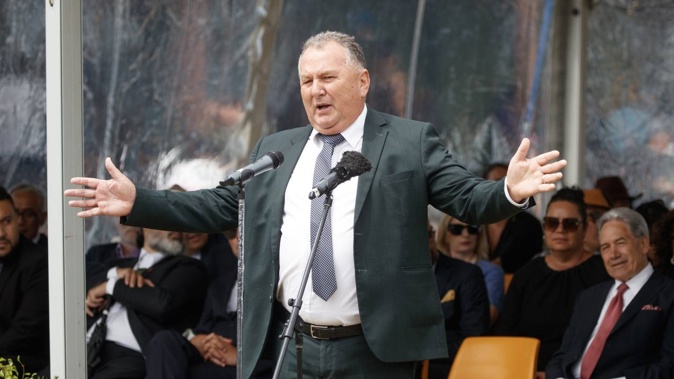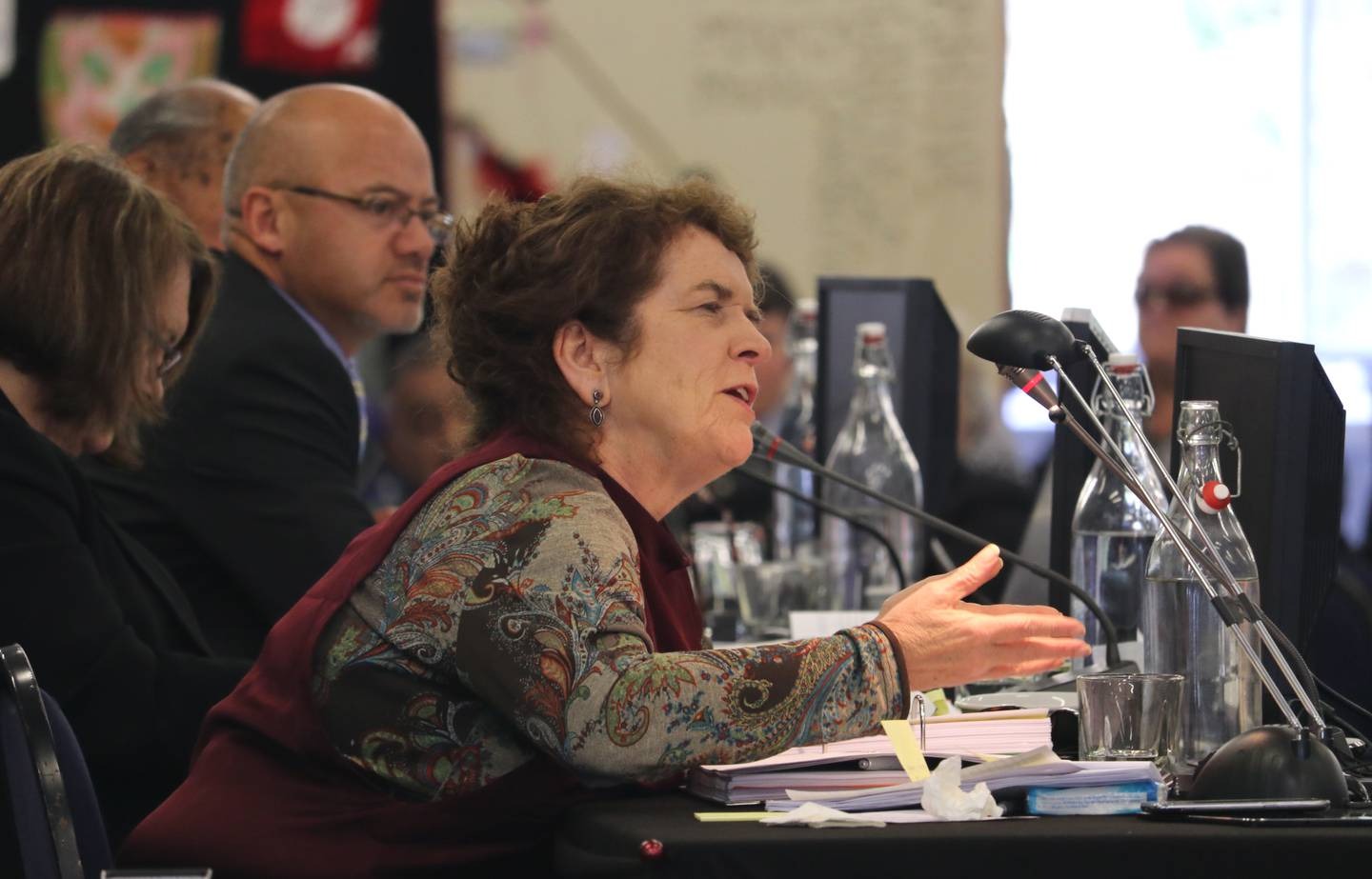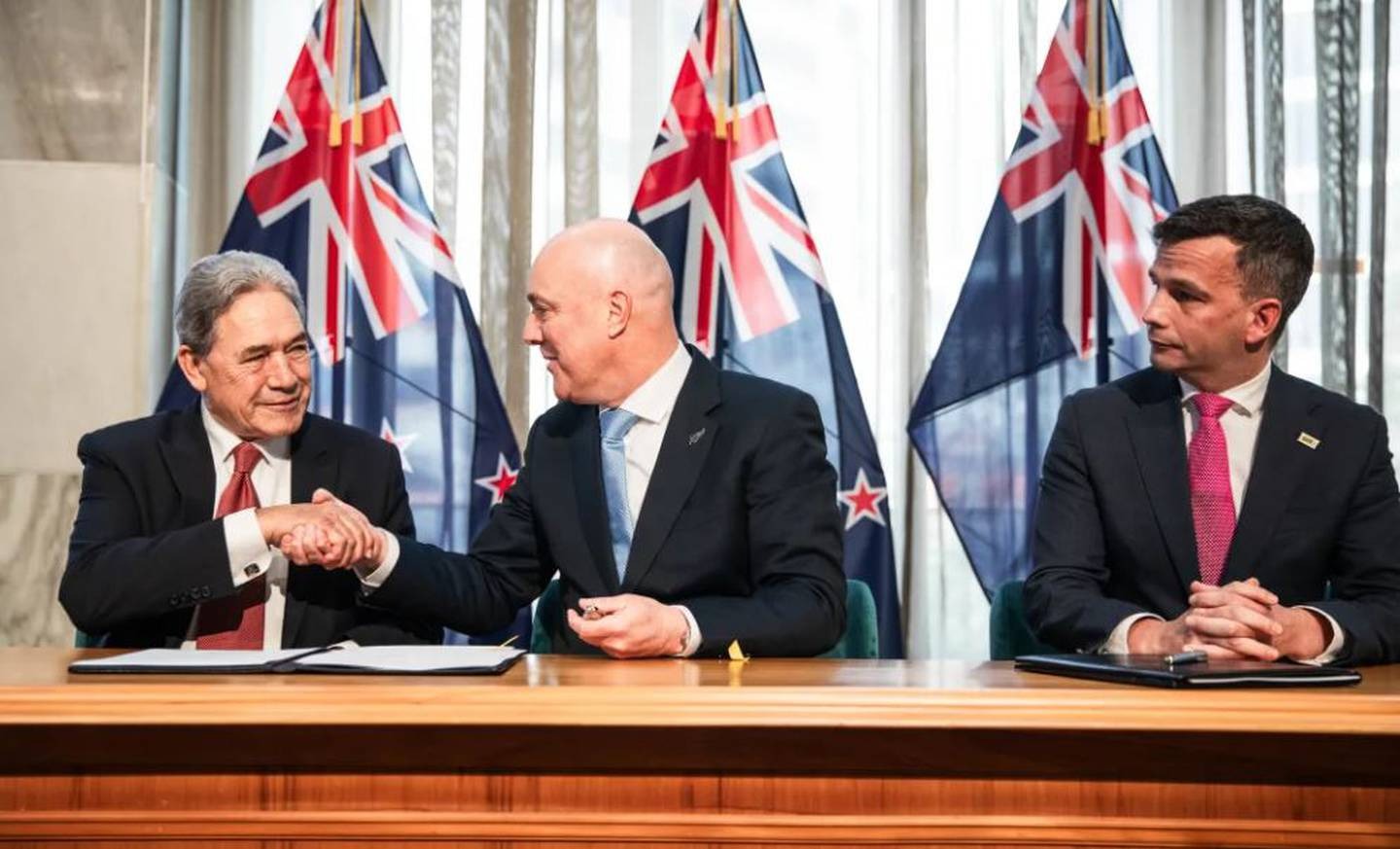
The Government’s agenda on Māori policy goes much further than Act’s bid to rewrite the principles of the Treaty of Waitangi, as Shane Jones has warned, and the way the Waitangi Tribunal operates will come under scrutiny too.
Jones, a New Zealand First minister, specifically noted the tribunal’s constitutional inquiry getting underway that will look, among other things, at sovereignty.
It is one of six so-called “kaupapa inquiries” in progress which are moving at a snail’s pace.
A closed-door meeting at Waitangi tomorrow is the first of what are intended to be several regional meetings between tribunal officials and Māori claimants to design the constitution inquiry and decide who can take part. Another is set down for March at Waipatu Marae in Hawke’s Bay.
Jones’ objections to the constitution inquiry, however, are not about its slow progress but that the tribunal is holding a constitutional inquiry at all.
“It’s political business; it’s not the Waitangi Tribunal business,” he told reporters at Ratana last week.
“An institution that’s been around for 50 years should not expect to continue on uncritically for another set of decades without being reviewed,” he said.
Among the clauses in New Zealand First’s coalition agreement with National is a commitment to: “Amend the Waitangi Tribunal legislation to refocus the scope, purpose, and nature of its inquiries back to the original intent of that legislation”.
Tribunal chair and chief judge of the Māori Land Court Caren Fox said in a memo published last week that the constitution inquiry would not primarily look at whether past Crown conduct constituted breaches of the Treaty.
“Rather the inquiry will first seek to enable parties to find common ground on what a Tiriti/Treaty-compliant constitution might look like today.”
The tribunal was established in 1975 as a permanent commission of inquiry “to make recommendations on claims relating to the practical application of the principles of the Treaty and, for that purpose, to determine its meaning and effect and whether certain matters are inconsistent with those principles”.
The Treaty of Waitangi Act gives the tribunal “exclusive authority to determine the meaning and effect of the Treaty as embodied in the two texts and to decide issues raised by the differences between them”.
 Chief Judge Caren Fox, the chairperson of the Waitangi Tribunal and chief judge of the Maori Land Court. Photo / Waitangi Tribunal
Chief Judge Caren Fox, the chairperson of the Waitangi Tribunal and chief judge of the Maori Land Court. Photo / Waitangi Tribunal
In almost all matters, the tribunal has only the power of recommendation.
Unlike the courts, the Waitangi Tribunal is able to undertake hearings about proposed legislation, such as its hearings last year into aspects of the RMA reform bill.
But much of the tribunal’s work since 1985 has been hearing claims about historical Treaty breaches by the Crown going back to 1840. But September 1, 2008 was the statutory deadline for filing claims relating to historical breaches of the Treaty.
Any claims relating to issues since then must relate to issues since September 2, 1992.
As the tribunal’s work on historic claims has reduced, the tribunal has given greater emphasis to dealing with contemporary claims. When those contemporary claims are based on a theme and are of national significance, the tribunal calls them “kaupapa” claims.
In a strategy report released in 2014 by its then chair, Judge Wilson Isaac, it set a greater priority on contemporary and kaupapa claims and the following year, Judge Isaac set out a programme of kaupapa inquiries the tribunal had identified.
What kaupapa inquiries are underway besides the constitution inquiry?
Inquiries into Māori military veterans; health services and outcomes; mana wāhine; housing policy and services; the justice system; and education services and outcomes. An inquiry into takutai moana (foreshore and seabed) has been completed. Five other inquiries have been foreshadowed by the tribunal but have not yet started: social services and social development; economic development; identity and culture; natural resources and environmental management; and citizenship rights and equality.
So who are the claimants in the constitution inquiry and what do they want?
That is not yet known because the claimants and their claim have not yet been publicly released by the tribunal. But it says the overarching areas of the inquiry will cover constitution, sovereignty, self-government, electoral system, representation, and local government.
Hasn’t the tribunal already released a report on sovereignty?
Yes and no. In one of its big district inquiries into historic claims, Te Paparahi o Te Raki Inquiry, centred only on the north. The tribunal concluded that the rangatira of the north did not cede sovereignty when they signed the Treaty of Waitangi in 1840. As well as hearing from claimants, it also heard detailed evidence from historians, many of whom said the chiefs had sought and been given assurance that they would be on equal footing as the proposed Governor. The tribunal made its finding in 2014, stage one of its inquiry, saying it had done so in order to provide context for the inquiry into post-1840 claims, stage two, which was released in December 2022.
So what has the Crown response been to the sovereignty finding?
Nothing formal. The Crown took part in the inquiry and put forward its case as to why it believed the chiefs had ceded sovereignty. But there has been no official response to the findings.
 Historian and Waitangi Tribunal member Robyn Anderson grilling one of the Crown lawyers during Te Paparahi o Te Raki inquiry in 2017. Photo / Northern Advocate
Historian and Waitangi Tribunal member Robyn Anderson grilling one of the Crown lawyers during Te Paparahi o Te Raki inquiry in 2017. Photo / Northern Advocate
Who will run the constitution inquiry?
Tribunal chair Judge Fox will be the presiding officer. From the 20 tribunal members she has appointed the following to the constitution inquiry: Environmentalist Kevin Prime; former broadcaster Derek Fox; lawyer and former president of the Māori Women’s Welfare League Prue Kapua; historian Dr Grant Phillipson; and emeritus law professor David Williams.
How long will it take?
The tribunal tends to move slowly for anything but urgent hearings such as the claim to stop the abolition of the Māori Health Authority. But it also has little discretion to decline to look into claims. The two-stage district inquiry mentioned above, Te Paparahi o Te Raki, was launched in 2008 and concluded in 2023. Its reports are often enormous. The kaupapa inquiry into Māori military veterans started hearings in 2016 and has been divided into two stages, one relating to after World War II and the other to before and including that war. The tribunal has also commissioned six research reports to assist the ongoing inquiry.
What will happen at tomorrow’s meeting at Waitangi?
Attendees will be discussing a report about how the constitution inquiry should proceed. In April last year, Judge Fox commissioned two groups of outside experts, a panel of tikanga experts and a panel of legal experts, to come up with a report to help the tribunal, claimants and the Crown to design the inquiry. The tikanga group is Waihoroi Shortland, Dame Naida Glavish, Associate Professor Linda Te Aho and Professor Meihana Durie. The legal expert group is Professor Jacinta Ruru, Dr Mark Hickford, and Matthew Smith.
What does the experts’ report find?
Their report has yet to be publicly released but in a memo published last week, Judge Fox said it proposed that the inquiry take the form of a series of wānanga (a learning place or event) and that the inquiry would mark a shift from the usual legalistic and adversarial approach but try to find common ground on what a constitution might look like today that was compliant with the Treaty. Judge Fox also said other possible subjects for discussion were how evidence would be given and by whom; who heard evidence, who recorded it and what happened to the evidence; how evidence was cross-examined or tested; what role lawyers should play; and if the tribunal’s report might be published.
Will the constitution inquiry be open to anyone with an interest to contribute?
That is not how the Waitangi Tribunal usually operates. Its main focus is on claimants and the Crown. Only Māori can lodge a claim the tribunal. It hears evidence from Pākehā but in their capacity as experts in a particular field. The tribunal publishes a lot of material relating to inquiries on its website and it publishes its extensive reports. If you want more detail on the constitution inquiry, it is numbered Wai 3300. The northern district inquiry Te Pararahi o Te Raki Inquiry is numbered Wai 1040, although the stage one report is 569 pages and stage two is 1837.
Haven’t there been plenty of constitutional inquiries already?
There have been quite a few. In 2004 there was a select committee inquiry into New Zealand’s constitutional arrangements but National and NZ First declined to take part. The last big public one was commissioned by the John Key National Government in 2011 as instigated by the Māori Party. It was co-chaired by Professor John Burrows and Sir Tipene O’Regan. After holding 120 hui, community meetings and events such as conferences to encourage a conversation on constitutional arrangements, its report found no appetite for radical change. The Iwi Chairs Group commissioned a report on constitutional reform in 2010 led by Margaret Mutu and Moana Jackson. The result was Matike Mai Aotearoa with six different models for power-sharing between Māori and the Crown by 2040, the 200th anniversary of the Treaty. There was also the ill-fated He Puapua report which was commissioned by the Labour-led Government in 2019, delivered in 2020, but was not made public until it was leaked in 2021. In its plan to implement the United Nations Declaration for the Rights of Indigenous People, it proposed transformational change by 2040 along the lines of one of the Matike Mai models.
 Prime Minister Christopher Luxon and NZ First leader Winston Peters seal their coalition deal in November. Photo / RNZ - Samuel Rillstone
Prime Minister Christopher Luxon and NZ First leader Winston Peters seal their coalition deal in November. Photo / RNZ - Samuel Rillstone
How will the Coalition Government review the Waitangi Tribunal?
No decisions have been made yet but it is likely to try to make it less controversial than Act’s proposed bill to rewrite the principles of the Treaty and put them into law. The Coalition may consult Labour to try to get broader buy-in to the review.
What other commitments did NZ First get on Māori policy in its coalition agreement with National?
Remove co-governance from the delivery of public services; issue a Cabinet Office circular to all central government organisations that it is the Government’s expectation that public services should be prioritised on the basis of need, not race; restore the right to local referendum on the establishment or ongoing use of Māori wards, including requiring a referendum on any wards established without referendum at the next Local Body elections; stop all work on He Puapua; confirm that the coalition Government does not recognise the UN Declaration on the Rights of Indigenous Peoples (UNDRIP) as having any binding legal effect on New Zealand; amend section 58 of the Marine and Coastal Area Act to make clear Parliament’s original intent, in light of the judgment of the Court of Appeal in Whakatohea Kotahitanga Waka (Edwards) and Ors vs Te Kahui and Whakatohea Maori Trust Board and Ors [2023] NZCA 504; conduct a comprehensive review of all legislation (except when it is related to, or substantive to, existing full and final Treaty settlements) that includes “the Principles of the Treaty of Waitangi” and replace all such references with specific words relating to the relevance and application of the Treaty, or repeal the references.
- NZ Herald
Take your Radio, Podcasts and Music with you








